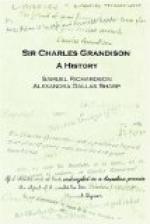Your uncle is a pleasant man: but tell him I say, that the man would be out of his wits, that did not make the preference he does in favour of his dame Selby, as he calls her. Tell him also, if you please, in return for his plain dealing, that I say, he studies too much for his pleasantries: he is continually hunting for occasions to be smart. I have heard my father say, that this was the fault of some wits of his acquaintance, whom he ranked among the witlings for it. If you think it will mortify him more, you may tell him, (for I am very revengeful when I think myself affronted,) that were I at liberty, which, God help me, I am not! I would sooner choose for a husband the man I have, (poor soul, as I now and then think him,) than such a teasing creature as himself, were both in my power, and both of an age. And I should have this good reason for my preference: your uncle and I should have been too much alike, and so been jealous of each other’s wit; whereas I can make my honest Lord G—— look about him, and admire me strangely, whenever I please.
But I am, it seems, a person of a particular character. Every one, you say, loves me, yet blames me. Odd characters, my dear, are needful to make even characters shine. You good girls would not be valued as you are, if there were not bad ones. Have you not heard it said, that all human excellence is but comparative? Pray allow of the contrast. You, I am sure, ought. You are an ungrateful creature, if, whenever you think of my over-livelinesses, as you call ’em, you don’t drop a courtesy, and say, you are obliged to me.
But still the attack made upon you in your dressing-room at Colnebrook, by my sister and me, sticks in your stomach—And why so? We were willing to shew you, that we were not the silly people you must have thought us, had we not been able to distinguish light from darkness. You, who ever were, I believe, one of the frankest-hearted girls in Britain, and admired for the ease and dignity given you by that frankness, were growing awkward, nay dishonest. Your gratitude! your gratitude! was the dust you wanted to throw into our eyes, that we might not see that you were governed by a stronger motive. You called us your friends, your sisters, but treated us not as either; and this man, and that, and t’other, you could refuse; and why? No reason given for it; and we were to be popt off with your gratitude, truly!—We were to believe just what you said, and no more; nay, not so much as you said. But we were not so implicit. Nor would you, in our case, have been so.
But ’you, perhaps, would not have violently broken in upon a poor thing, who thought we were blind, because she was not willing we should see.’— May be not: but then, in that case, we were honester than you would have been; that’s all. Here, said I, Lady L——, is this poor girl awkwardly struggling to conceal what every body sees; and, seeing, applauds her for, the man considered:




